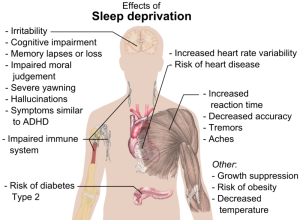Daytime sleeping proves to be more detrimental to health than not sleeping at all. That is whack! Well according to a new study, shifted sleep disrupts gene activity even more than not getting enough sleep. And whether you like to admit it or not, staying up late to write a research paper or to finish up a Science 300 project proposal can be a regular occurrence in a university student’s life. With such a common deprivation as sleep, we are all yearning for that opportune daytime nap. But after you learn how long periods of daytime sleeping can disrupt your gene function – you’ll think again before napping overtime.

Daytime sleeping is a necessity for night shift workers, travellers experiencing jet lag, and of course the average university student. This is the condition that scientists from the Sleep Research Centre at the University of Surrey wanted to recreate when they conducted their experiment. They purposefully altered 22 participants’ sleep cycles by using a light controlled sleep lab. Lead researcher Derk-Jan Dijk and his team were able to shift the participants’ biological clocks 12 hours out of sync and over three days, blood tests revealed decreased gene expression.
On a full night’s sleep, after the body’s rhythm is reset, 14,000 genes (6.4%) were in sync with the body. When sleep was shifted, the number of genes matching the body’s clock dropped drastically to only 228 (1%). That is an observed 6-fold drop! Compared to a previous study on sleep deprivation, the gene expression synchronicity only decreased from 9% to 7% from regular to deprived sleep.
Genes carry instruction for coding proteins. The timing of when proteins are made is fundamental as their production greatly corresponds to our behaviours, claims neuroscientist at Harvard, Frank Scheer. Just about every chemical signal, hormone and tissue from the tips of your toes to the hair on your head is constructed of proteins. Therefore this disruption can have many negative impacts on everything from metabolism and immune response to stress levels and mood – is this starting to worry you or what? Longterm it can even increase risk of obesity, stroke, early death, and cancer.
Now we know that our overall health based on gene function can be hugely impacted by imbalanced sleep cycles. Although here is no direct link between daytime sleeping and these health problems, this study does begin to enhance our understanding on why sleep has such a powerful influence on our health. Now after hearing these worrisome implications, I think we will all strive a little harder to get some regular sleep at night, don’t you think?
Written by Sophia Hu
——————————————————————————————————
Further reading:
http://www.forbes.com/sites/melaniehaiken/2014/01/22/jet-lag-and-working-at-night-disrupts-your-genes-new-study-shows/
http://consumer.healthday.com/sleep-disorder-information-33/misc-sleep-problems-news-626/sleeping-during-the-day-may-throw-your-genes-into-disarray-684040.html
http://www.the-scientist.com/?articles.view/articleNo/38916/title/Daytime-Sleep-Alters-Human-Transcriptome/


5 responses to “Sleep During the Day Throws Genes Into Disarray”